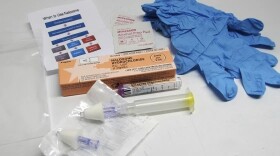-
The latest nutrition guidelines urge Americans to avoid highly-processed food. But, when it comes to carbs, many people don't know which ones are ultra-processed. Here's an easy way to find out.
-
This band of airborne health workers bring essential medical care to isolated communities in the southern African nation. In addition to turbulence, they face a new obstacle: budget cuts.
-
A federal judge in Illinois quickly issued a restraining order after the Trump administration slashed more than $600 million in CDC grants to four blue states.
-
James Van Der Beek's death at age 48 highlights a sad statistic: More people under 50 are getting colorectal cancer.
-
The ruling temporarily blocks the Trump Administration from cutting $600 million in public health grants that had already been allocated to four Democratic-led states.
-
The Reverend Prince Edward Graves Recovery and Treatment Center opens on Thursday, February 12. The center, managed by the nonprofit Daymark Recovery Services, will address the need for long-term residential recovery services in Guilford County.
-
Zaas is a pulmonary and critical care physician and a professor of internal medicine at Wake Forest.
-
Elite athletes often push through pain to achieve victory. But, everyday exercisers need to distinguish between soreness which is normal and pain which is the body's way of telling you to stop.
-
They're often paid low wages and lack job protections. A petition to the country's supreme court to support their demands did not see success — and they are protesting.
-
Drugs like Zepbound and Wegovy are intended for people who are overweight. Some patients are using them after bariatric surgery to keep pounds from creeping back. Others may just want to lose a few pounds.
-
Friendship expert Kat Vellos shares tips on how to make a new friendship stick, including what to do together, how often to hang out — and what to do if the vibes just aren't there.
-
GoodGym, based in the UK, combines exercising with volunteering. How does this combination positively impact people?












